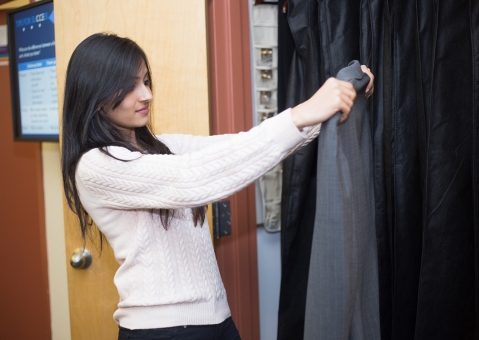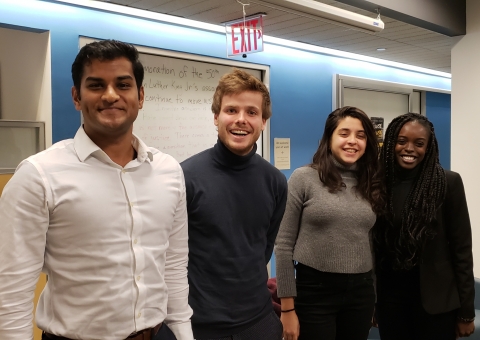Center for Career Education
We at the Center for Career Education (CCE) provide relevant services and support including:
- Career advising and resources to understand your employment options and to develop a plan for your next steps, whether that be in an internship or job search or for graduate school
- Events tailored to international students’ interests, needs, and challenges
- Resources to identify employers willing to sponsor
We also work closely with colleagues at the International Student and Scholars Office (ISSO) and your academic advisors at the CC/SEAS Berick Center for Student Advising and GS Dean of Students Office to support you as international students. We encourage you to build relationships with career, academic, and ISSO advisors to learn how our services and resources can support you. Your advisors will help you to understand your visa status, how to obtain work authorization, how your program of study can influence your career search, and effective ways to explore careers, connect with employers, and apply to jobs as an international student. We also serve on the International Student Resources Team led by International @ Columbia and partner regularly with the International Student Advisory Board (ISAB) to understand your needs and co-host events.
On-Campus Jobs And Internships
See our Find On-Campus Employment resource and visit CCE to discuss your on-campus job search strategy with a career counselor. Note that full time F-1 and J-1 students are eligible for “casual” employment on campus, which means you are paid by Columbia University.
Off-Campus Jobs And Internships
Navigating LionSHARE
When conducting a job or internship search, review the Find an Internship or Job resource to learn how to find opportunities on LionSHARE, powered by Handshake. You can filter positions by choosing the field “Work authorization” and checking the boxes for “Will sponsor or doesn’t require US work visa” and/or “Accepts OPT/CPT.” This is helpful to identify employers that can hire international students.
It is also important to carefully review job descriptions as sponsorship information is often included.
In your profile in LionSHARE, you also are asked two questions about your status: Are you legally authorized to work in the US? and Will you now or in the future require sponsorship? F1 students are legally authorized to work in the US using CPT and/or OPT (benefits of F1 status, review ISSO website for eligibilty details) so the answer is Yes to question 1 and Yes to question 2 as you will require your employer to sponsor you if you are to remain working in the US after your OPT exprires.
Your Job and Internship Search
As an international student, it is essential that you fully understand your eligibility to work in the location of the internship or job and the process to gain work authorization. Eligibility to work considerations include:
- Location of the internship or job, i.e., is it in the U.S. or another country?
- Your visa/work authorization for the location of the internship or job
- How long you have been in full-time student status in the U.S. for positions in the U.S.
- Requirements specified by the employer for the internship or job
Employers are expected to meet all requirements of the Fair Labor Standards Act (FLSA). See also criteria for unpaid internships as outlined by the U.S. Department of Labor. Unless you are working on campus, you will obtain work authorization under CPT or OPT to pursue jobs and internships off-campus. Please connect with the ISSO before accepting any positions to ensure you comply with your visa requirements.
Avoiding Scams and Fraudulent Opportunities
We are committed to partnering with employers that comply with employment law in all recruiting activities. As you conduct your job search, learn how to avoid scams and fraudulent activity with this helpful guide: identifying fraudulent postings. If you suspect a position or employer you encountered through LionSHARE is fraudulent, please contact us at careereducation-ear@columbia.edu.
Illegal Interview Questions
Any questions that are meant to reveal your age, race, national origin, citizenship, gender, religion, marital status, sexual orientation, or arrest records are illegal. See our resources on Illegal Questions and How to Respond.
Communicating with Employers
Networking with Employers and Alumni
For many international students, connecting with employers and alumni can be daunting and vary widely from networking back home. A great way to start is to find alumni who are from similar backgrounds. Having an instant connection about your cultural background can help ease the nerves of networking. You’ll also gain valuable tips about how they networked effectively. Take advantage of attending events on and off campus. We also encourage you to make an appointment and practice with a career counselor, as networking is a skill that you can develop.
Applying to positions
When applying for opportunities “will you now or in the future require sponsorship” is another way companies can legally ask about your status. Answer as truthfully as possible. For example, if you are an international student on an F-1 visa and want to work in the United States after your OPT finishes then the answer to this question is yes.
A company who accepts OPT and/or CPT means that they are willing to hire international students who have OPT and/or CPT. This does not necessarily mean they will provide sponsorship and it is up to you to talk to your employer about whether they sponsor in order for you to stay with the organization after your OPT finishes.
Work Authorization In The USA, CPT, and OPT
Review the Employment section of the ISSO website a a first step to understand work authorization benefits of your student visa, timelines, and processes required to secure work authorization for off-campus positions in the US.
Curricular Practical Training (CPT) is authorization for off-campus employment affilated with a required or elective academic course that is an integral part of the established curriculum of your degree program. Eligibility and process to apply for CPT, which is often described as academic credit affiliated with an internship or internship credit, is detailed on the ISSO website under F-1 CPT. Undergraduate students in CC, GS, and SEAS are eligible to apply for CPT after they declare their major. Each school has eligibility criteria, a maximum number of times you can apply for CPT, and a process to register for a fieldwork class. Begin by speaking with with your academic advisor, major department, and the ISSO to determine your eligibility and the process to pursue CPT. We at CCE can work with you to find internships where employers accept students with CPT work authorization.
Optional Practical Training (OPT) is a benefit of F-1 student status that allows students to gain experience in their field of study by applying for off-campus work authorization. You may use a small portion of your OPT during your degree program after two semesters in full-time F-1 student status in the US to work off-campus and save the remainder of your OPT time for after graduation. This is known as pre-completion OPT or OPT during your program. To learn more about pre-completion OPT, post-completion OPT and the STEM extension, please visit the F-1 OPT sections under Employment on the ISSO website.
It is important to work with ISSO, Career, and Adademic advisors to plan for any off-campus work experiences in the US so that you understand how CPT and OPT can be used effectively through your four years at Columbia and after graduation. It is also important to understand how your field of study impacts work authorization. We encourage students to reflect on the connections between an internship or job of interest and your studies. Identify skills and competencies required from the internship or job description, review classes on your transcript, review and identify learning outcomes described on department/major websites, and review Exploring Majors tipsheets for language describing learning from the major to find any connections between your field of study or major and internships and jobs.
Employment sponsorship is when a company supports your application for an employment visa to stay and work in the US long term.
Your Next Steps
We encourage you to explore a three-pronged approach to your career search including graduate school, opportunities in the US and global opportunities concurrently as you progress through your studies. Meet with a career counselor to create a plan tailored to your interests.
CCE Resources
- GoinGlobal
- Offers lists of employers who have sponsored visas in the past. Once logged in, go to the “H1B Info” tab at the top for the list of employers, and then utilize this list to begin searching for opportunities of interest.
- Uniworld
- Provides a directory of US firms in foreign countries and foreign firms in the US. Utilize this directory to identify employers to target when searching for opportunities.
- MyVisaJobs
- Provides lists of employers who have sponsored visas in the past and other career information for international students.
Additional Columbia Resources



